
by Brian Shilhavy
Editor, Health Impact News
It has been widely reported in the Alternative Media this month that the FDA has banned trans fats, and that they will no longer be allowed in foods starting December 22, 2023.
Please note: if you believe that the FDA always tells us the truth because they want to protect us, then there is no need for you to read any further. Go on trusting them and their advice for drugs, vaccines, and food. Just make sure your estate is in order, as it has been widely shown that following the FDA’s advice leads to shortened lifespans.
If, on the other hand, you understand that the FDA is simply the marketing branch for Big Pharma and Big Food, which looks out for THEIR best interests and how to maximize profits, and that it is almost always wise to do the exact OPPOSITE of what the FDA recommends, then read on.
I have thoroughly researched this claim, and as far as I can see this (dis)information originates from a single article published on Epoch Times by Mary Gillis, which was also republished by ZeroHedge News:
That guilty-pleasure donut you love will soon get a healthy makeover.
Known as partially hydrogenated oil, or PHO, one type of trans fat commonly found in commercial baked goods linked to heart disease and other health issues for years is about to be eliminated from the U.S. food supply.
The long road of removing trans fats from the food supply is about to end.
It started in 2015 when the U.S. Food and Drug Administration (FDA) ruled that artificial trans fats were unsafe to eat. The agency gave the food industry three years to reformulate products and ensure an orderly transition in the marketplace.
Starting Dec. 22, 2023, no products containing PHOs will be allowed on grocery store shelves. (Full Article.)
First of all, the “long road” to warn consumers in the U.S. about the dangers of trans fats began long before 2015. It began in 2006, when the FDA mandated that food nutritional labels had to identify the deadly trans fats.
However, the FDA had a “loophole” that allowed foods containing fewer than 0.5 grams of trans fat per serving to claim “zero trans fat.” (Yes, the FDA allows companies to lie about their products.)
The first proposed ban on trans fats was issued by the FDA in 2013, ten years ago.
Here is an article we published in 2013:
Is Trans Fat “Ban” Paving Way to Promote New Monsanto GMO Product?
And here’s a link to a news report from the Corporate Media that was published back in 2013:
FDA moves to phase out trans fats from food, citing health concerns
I have searched the FDA website to find the most current news and rulings on this issue of deadly trans fats, which is found here. (Or here, since pages on the FDA’s website tend to change or disappear frequently.)
Here is the link to the actual “Final Rule” on “Revocation of Uses of Partially Hydrogenated Oils in Foods” in the Federal Register.
Here is the “Summary”, and as you read it please look for the word “ban“:
The Food and Drug Administration (FDA or we) is amending our regulations that provide for the use of partially hydrogenated oils (PHOs) in food in light of our determination that PHOs are no longer generally recognized as safe (GRAS).
The rule removes PHOs as an optional ingredient in the standards of identity for peanut butter and canned tuna. It revises FDA’s regulations affirming food substances as GRAS pertaining to menhaden oil and rapeseed oil to no longer include partially hydrogenated forms of these oils, and deletes the regulation affirming hydrogenated fish oil as GRAS as an indirect food substance.
We are also revoking prior sanctions (i.e.,pre-1958 authorization of certain uses) for the use of PHOs in margarine, shortening, and bread, rolls, and buns based on our conclusion that these uses of PHOs may be injurious to health.
We are issuing these amendments directly as a final rule because they are noncontroversial given the public health risks associated with PHOs and the increasing use of PHO alternatives, and we anticipate no significant adverse comments because PHOs were declared no longer GRAS for any use in human food in 2015. (Emphasis mine.)
Didn’t see the word “ban” anywhere?
Here are the FDA’s own words published here (and here):
The FDA’s actions regarding PHOs address artificial sources of trans fat, but trans fat will not be completely removed from the food supply because it occurs naturally in meat and dairy products and is present at very low levels in other edible oils.
Again, nothing on this page about “banning” trans fats.
In fact, they are still allowing it in small quantities for edible oils, and the food manufacturers do not have to list them on their labels as long as they are below the “accepted” limits the FDA has determined are allowable for poisons in edible oils.
What are Trans Fats and What are Food Manufacturers Using to Replace Them?
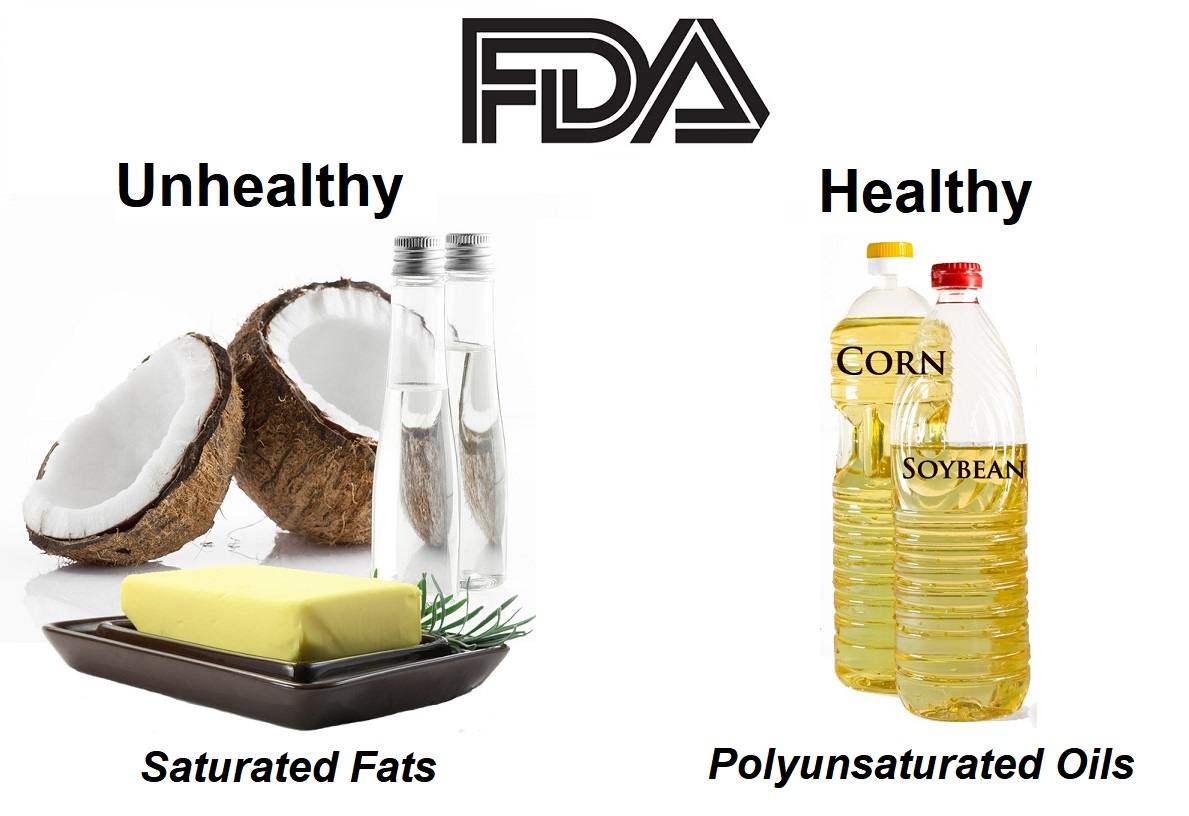
Trans fats are toxic byproducts produced by hydrogenating polyunsaturated oils, such as vegetable oils derived from soybeans and corn, two subsidized cash crops in the U.S. that were only used to extract oil from after WW II and the development of seed “expeller-pressed” technology.
Prior to WW II, these “dietary” oils did not exist in the human food chain.
But they are very unstable oils, with a very short shelf life, so technology was used to “hydrogenate” them to make them more solid, and convert them from “oils” (liquid at room temperature) to “fats” (solid at room temperature.)
Nature, however, already has its own version of “fats” that have been used in human nutrition for thousands of years, and they are called “saturated fats.” They are found in animal sources, such as lard, tallow, and butter, and also from vegetable sources such as coconut and palm “oil”. These are known as the “tropical oils”, as in their native environment in the tropical countries they tend to stay liquid at room temperature, but are mostly solid (fats) in northern climates, such as North America and Europe.
They are VERY shelf stable, as Virgin Coconut Oil and Virgin Palm Oil, in their natural states, will not go rancid for decades, if at all, even at room temperature.
When the Japanese cut off the shipping lanes from the tropical countries to the U.S. and Europe during WW II, American food processors began hydrogenating polyunsaturated oils like corn and soy to make then mimic saturated fats.
Years later, it was determined that the byproducts from these hydrogenated oils were toxic and disease-causing, and many nations started banning them.
But when WW II ended, the Globalists in the U.S. did not want to lose any market share back to the tropical oils, so they did what they always do to protect their market, they got the U.S. Government to declare that saturated fats were harmful, and to recommend hydrogenated polyunsaturated fats instead, supporting American agricultural interests.
So what has the food industry done to replace trans fats? After all, the FDA has given them more than a decade to find alternatives, as most of the rest of the world has long since banned them.
The rational thing to do would be to reverse their harmful “low-fat” diet advice and only promote polyunsaturated oils as “healthy”, and return to the traditional saturated fats that our ancestors grew up consuming.
But no, that could never be, as it would take away corporate profits at the expense of having healthier fats and oils benefit Americans’ health. It would also remove their main motive to promote cholesterol-lowering drugs, as they need to demonize saturated fats by scaring everyone that if they consume them, they will have high cholesterol that leads to heart disease, the “lipid theory” of heart disease that has been widely debunked in the scientific literature.
Therefore, they did what the Globalists always do, and just created a newer toxic form of polyunsaturated fats that will comply with FDA labeling laws so they can continue controlling the market with maximum corporate profits: Interesterified fats.
Are these newer industrialized fats, “Interesterified fats,” any healthier than “trans fats”?
They haven’t been in the human food chain very long yet to know the long-term effects, but a search in the peer-reviewed studies on PubMed does return 146 results, and they are mostly all negative.
Here are a couple of the latest ones:
Mechanisms of interesterified fat digestibility in a muffin matrix using a dynamic gastric model
Abstract
Industrially generated trans-fats have been linked with cardiovascular disease (CVD) and have thus been replaced by interesterified (IE) fats, in foods. Interesterification rearranges fatty acids on the glycerol backbone of a triacylglycerol molecule.
However, the impact of IE fat on health is unknown.
We recently reported differences in lipid absorption kinetics between IE and rapeseed oil (RO). Here, we investigated the mechanisms underpinning IE fat digestion kinetics in the same muffins baked using an IE fat, non-IE fat [with the same fatty acid composition] and rapeseed oil (RO) under simulated conditions. IE and non-IE fats were largely solid in the gastric phase and strongly associated within the muffin matrix, whereas RO formed liquid droplets which separated from the matrix. No significant difference in lipolysis rates was detected between IE and non-IE fats.
The lipolysis of the RO fat was slower, due to long-chain PUFAs. Interesterification itself did not affect digestibility, but the strong interaction between the hard fats and the muffin matrix resulted in extensive creaming of the matrix in the stomach, leading to delayed gastric emptying compared to the RO sample. The rate and extent of lipolysis were determined by the amount of fat available and the structure of the fat. This demonstrates the importance of the physical behaviour of the fats during digestion and provides a mechanistic understanding of the overall lipid digestion of IE fats, which relates to their physiological response. (Source.)
(Editor’s note: the more common name for “rapeseed oil” is “Canola Oil”, which itself is already highly toxic. And this was the “control oil”!) See:
Why Canola Oil is Not the Healthy Oil You’ve Been Led to Believe
Study: Is Canola Oil Consumption Linked to Alzheimer’s Disease?
Interesterified fat maternal consumption before conception programms memory and learning of adulthood offspring: How big is this deleterious repercussion?
Abstract
In recent years, interesterified fat (IF) has largely replaced trans fat in industrialized food. Studies of our research group showed that IF consumption may not be safe for central nervous system (CNS) functions.
Our current aim was to evaluate IF maternal consumption before conception on cognitive performance of adult rat offspring. Female Wistar rats were fed with standard chow plus 20% soybean and fish oil mix (control group) or plus 20% IF from weaning until adulthood (before mating), when the diets were replaced by standard chow only.
Following the gestation and pups’ development, locomotion and memory performance followed by neurotrophin immunocontent and fatty acids (FA) profile in the hippocampus of the adulthood male offspring were quantified.
Maternal IF consumption before conception decreased hippocampal palmitoleic acid incorporation, proBDNF and BDNF levels, decreasing both exploratory activity and memory performance in adult offspring.
Considering that, the adult male offspring did not consume IF directly, further studies are needed to understand the molecular mechanisms and if the IF maternal preconception consumption could induce the epigenetic changes observed here.
Our outcomes reinforce an immediate necessity to monitor and / or question the replacement of trans fat by IF with further studies involving CNS functions. (Source.)
The Globalists Know that Traditional Saturated Fats are Healthy: They Just Don’t Want YOU to Know, because it Decreases Their Profits in Big Pharma and Big Food
The evidence that traditional saturated fats are actually very healthy is so overwhelming, that the Globalists do their best to suppress this information from the public, because it is a threat to their business model.
Since the early 1930s it has been known that a diet high in saturated fat is not only NOT unhealthy, but it can actually cure disease.
This is called the “Ketogenic Diet“, that was first developed by doctors at Johns Hopkins to treat children with epilepsy when their drugs failed.
A search on Health Impact News on the “Ketogenic Diet” will return over 100 results, showing how this high fat diet can cure more than just epilepsy, but also cancer and many other diseases.
Living in the Philippines from 1998 through 2002, I was the one who reintroduced coconut oil back to American consumers, the most “saturated fat” in nature, and one of the most dramatic health benefits that we discovered from users was Virgin Coconut Oil’s ability to sometimes reverse diseases such as Alzheimer’s Disease.
Some peer-reviewed studies were started at that time in the U.S., more than a decade ago, but were never completed for “some reason.”
But today, much of that research is being carried on outside the U.S., as official USDA dietary advice continues to demonize Coconut Oil and warn people not to consume it.
Here is one study out of Turkey that was just published in the Journal of Applied Toxicology:
Evaluation of possible neuroprotective effects of virgin coconut oil on aluminum-induced neurotoxicity in an in vitro Alzheimer’s disease model
Abstract
Alzheimer’s disease (AD) is a progressive neurological disorder that affects various cognitive functions, behavior, and personality. AD is thought to be caused by a combination of genetic and environmental factors, including exposure to aluminum (Al).
Virgin coconut oil (VCO) may have potential as a natural neuroprotectant against AD. Aim of this study was to determine neuroprotective effects of VCO on Al-induced neurotoxicity in an in vitro AD model. SH-SY5Y cells were initially cultured in normal growth medium and then differentiated by reducing fetal bovine serum content and adding retinoic acid (RA).
Later, brain-derived neurotrophic factor (BDNF) was added along with RA. The differentiation process was completed on the seventh day. Study groups (n = 3) were designed as control group, VCO group, Al group, Al-VCO group, Alzheimer model (AD) group, AD + Al-exposed group (AD+Al), AD + VCO applied group (AD + VCO) and AD + Al-exposed + VCO applied group (AD + Al + VCO). Specific markers of AD (hyperphosphorylated Tau protein, amyloid beta 1–40 peptide, and amyloid precursor protein) were measured in all groups.
In addition, oxidative stress parameters (total antioxidant capacity, lipid peroxidase, protein carbonyl, and reactive oxygen species) and neurotransmitter-related parameters (dopamine, dopamine transporter acetylcholine, and synuclein alpha levels, acetylcholinesterase activity) were measured comparatively in the study groups.
VCO reduced amyloid beta and hyperphosphorylated Tau protein levels in the study groups. In addition, oxidative stress levels decreased, and neurotransmitter parameters improved with VCO.
Our study shows that VCO may have potential therapeutic effects in Alzheimer’s disease and further experiments are needed to determine its efficacy. (Source.)
Learn more about Virgin Coconut Oil’s success with people suffering from dementia such as Alzheimer’s Disease on our CoconutOil.com website.
I am also offering my book on Virgin Coconut Oil and Alzheimer’s Disease, A Holistic Guide to Geriatric Care that you can download here for FREE. Feel free to pass it on to others, as this is potentially life-saving information.
How Long did YOUR Ancestors Live While Eating BACON, LARD, & WHOLE MILK?

To end, I want to refer you to an article published by DaNelle Wolford that she graciously allowed us to republish back in 2014.
Excerpt:
My Great-Grandma was a tough ol’ chick. She ate real, traditional food; could cook up fried chicken from scratch. When I say “from scratch” I literally mean “from scratch”. As in, she would kill a chicken, dress it, coat it with flour, and fry that baby up in a big ‘ol frying pan of lard. She was an amazing woman, my great-grandma. That woman wasn’t afraid of anything. She’d sleep out in the dark woods with hungry bears if you dared her to. She was that tough.
Our ancestors didn’t worry about heart disease, cancer or diabetes. They didn’t fear Alzheimer’s or Parkinson’s disease. These diseases were so incredibly rare before the 1900s, that they didn’t need scientists to solve any mystery. There was no mystery! Our ancestors simply ate food – real food, and were nourished. Sure, there was illness and life was not perfect. But chronic degenerative diseases rates were incredibly low.
The leading cause of death before 1900 was one of four things: infancy death, death from childbirth, death from infections, & death from accidents. Today, the leading causes of death are heart disease & cancer.
Clearly, there’s something we need to change. (Full article with comments.)
Related:
Public Health SCANDAL! Sugar Industry Hid Science Linking Sugar to Heart Disease – Blamed Saturated Fats and Cholesterol Instead
Coconut Oil and Other Saturated Fats Are Essential for Health
Comment on this article at HealthImpactNews.com.



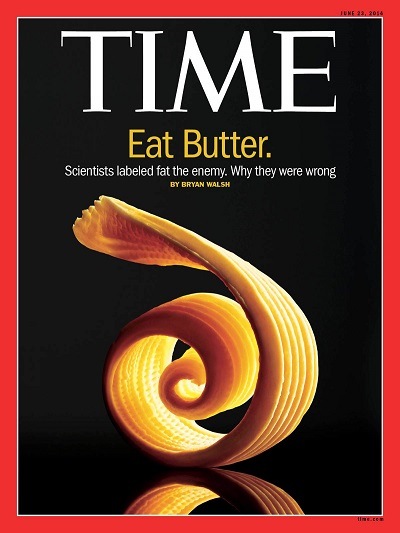
 The FDA has NOT Banned Trans Fats! Traditional Saturated Fats like Coconut Oil Continue to Shine for Alzheimer's Disease but are Condemned by U.S. Dietary Advice
The FDA has NOT Banned Trans Fats! Traditional Saturated Fats like Coconut Oil Continue to Shine for Alzheimer's Disease but are Condemned by U.S. Dietary Advice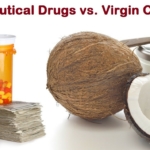 The Evidence of Coconut Oil's Superiority Over Drugs in Destroying Pathogens Continues to be Published in Peer-Reviewed Journals
The Evidence of Coconut Oil's Superiority Over Drugs in Destroying Pathogens Continues to be Published in Peer-Reviewed Journals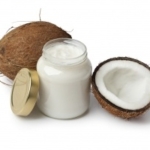 Study: Virgin Coconut Oil Protects Neuronal Damage and Mortality after a Stroke Incidence
Study: Virgin Coconut Oil Protects Neuronal Damage and Mortality after a Stroke Incidence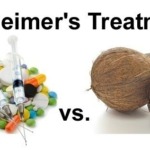 Another Phase 3 Trial Failure to Develop an Alzheimer's Drug Shows Why Virgin Coconut Oil is Needed to Prevent Dementia
Another Phase 3 Trial Failure to Develop an Alzheimer's Drug Shows Why Virgin Coconut Oil is Needed to Prevent Dementia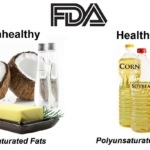 FDA Food Police want to Dictate What Foods are "Healthy" in New Guidelines Criminalizing Traditional Fats Like Butter and Coconut Oil
FDA Food Police want to Dictate What Foods are "Healthy" in New Guidelines Criminalizing Traditional Fats Like Butter and Coconut Oil